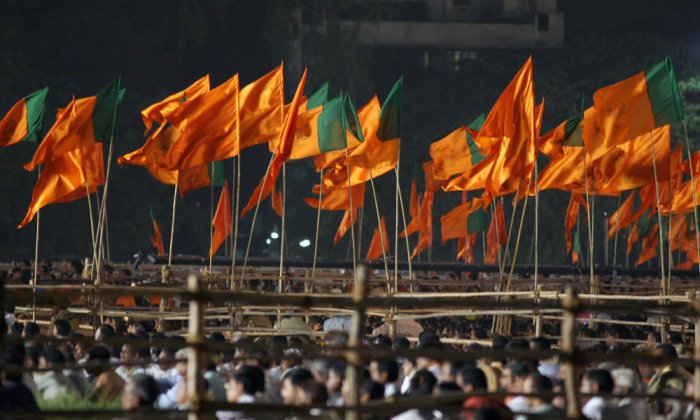
Modi’s Bharatiya Janata Party (BJP) was formed in 1980. Like India’s other nationalisms, however, its roots go back to the late 19th century, Image: BJP and Shiv Sena flags, via Wikipedia Commons
by Hammad Baloch 3 November 2023
The media’s influence in shaping public opinion and molding the political discourse is unmistakable. In India, the role of the media, especially news channels, has come under scrutiny for potentially being leveraged to serve the interests of the ruling BJP government, headed by Prime Minister Narendra Modi. This article delves into the evolving dynamics of Indian media and how they have been used to advance the BJP’s political agenda, particularly in light of the forthcoming 2024 Lok Sabha elections.
The rise of media has heralded a new era where the dissemination of information plays a central role in shaping public narratives. In this ongoing “Battle of Narratives,” those who control the flow of information wield significant power. A noteworthy example is the BJP government in India, which has seemingly been effective in using Indian media to sway public opinion in its favor, secure votes, promote its Hindutva policies, and divert attention from critical domestic issues.
Since 2014, a discernible pattern has emerged, with media outlets favoring the Modi government strategically utilizing their platforms to bolster the BJP’s agenda. As the 2024 Lok Sabha elections loom, this trend is resurfacing. Indian news channels are once again being employed as instruments of diversion, steering public attention away from pressing issues such as rising concerns over Islamophobia, communal violence, and ongoing insurgencies in states like Punjab and the Northeast.
The media’s role in diversion is evident through extensive coverage of Pakistan’s internal affairs, which seems inconsequential to the pressing issues within India. Events such as the closure of Quaid-i-Azam University in Islamabad due to disputes between the university administration and students receive disproportionate attention. Similarly, NDTV’s extensive coverage of a live talk show altercation between political figures in Pakistan ahead of the 2023-2024 elections underscores the diversionary tactics employed.
The diversion tactics of Indian media have reached unparalleled levels, especially following the BJP’s significant setback in the May 2023 Karnataka legislative assembly elections. Instead of critically assessing the Modi government’s performance over the past five years, Indian news channels have become fixated on reporting inconsequential events in Pakistan. This fixation often portrays every border escalation and inter-state incident as a heroic endeavor by the Indian government, diverting the focus away from pressing domestic issues.
The proliferation of Hindutva policies under the BJP government has led to a concerning surge in anti-Islamic sentiment in India. The policies and rhetoric emerging from the BJP have contributed to an environment where religious intolerance is on the rise, challenging India’s claim to be a secular nation. Data from Hindutva Watch, an independent research initiative, reveals a disturbing trend in the first half of 2023, with over 255 instances of anti-Islam hate speech gatherings and rallies recorded across 17 states, particularly in states governed by the BJP. The media’s fixation on external matters often diverts attention from persisting insurgencies in regions like Nagaland, Punjab, and Kashmir. These critical domestic issues frequently evade the spotlight of Indian news channels, raising questions about a potential desire to preserve a politically untarnished image of the Modi regime.
The media’s role in shaping public opinion and influencing political outcomes cannot be underestimated. The BJP government’s use of media for advancing a pro-Modi agenda and promoting an anti-Pakistan narrative is not a new phenomenon, as seen in the lead-up to the 2019 General Elections following the Pulwama attack. With the BJP facing setbacks in the Karnataka Legislative Elections in 2023, the focus now appears to be on securing victory in the forthcoming 2024 Lok Sabha Elections, potentially by leveraging anti-Pakistani sentiments among the Indian populace for political gains. Indian news channels, with their substantial influence on the public, are pivotal tools in this endeavor. The question that arises is whether we are witnessing the potential for another incident similar to Pulwama in the near future, as political diversion and media manipulation continue to shape the narrative in India.
